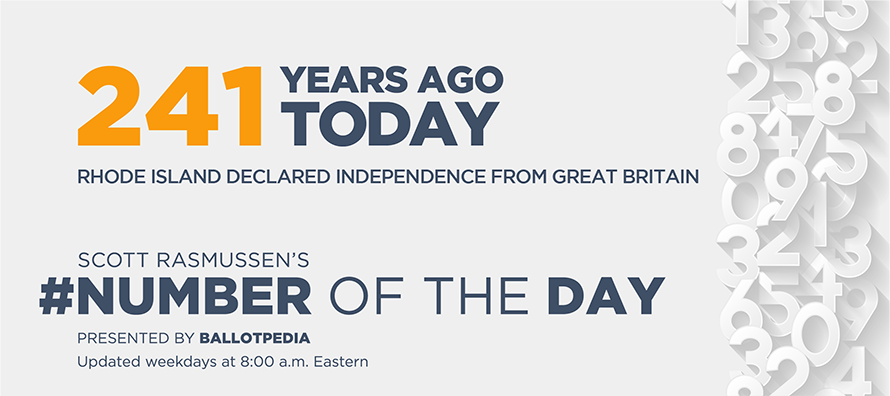Scott Rasmussen's Number of the Day for May 4, 2017
The Number of the Day columns published on Ballotpedia reflect the views of the author.
May 4, 2017: On May 4, 1776, the colony of Rhode Island declared its independence from Great Britain. That was two full months before the Continental Congress got around to issuing the document we now revere as the Declaration of Independence.
But even though Rhode Island acted on its own, the state was thinking big. To emphasize that official proceedings should be performed in the name of the state, they replaced the phrase "God save the King" with "God save the United Colonies.”[1] Independence was coming to all of Britain’s North American colonies.
| Even though Rhode Island acted on its own, the state was thinking big. |
Ironically, though it was the first colony to declare independence, Rhode Island later became the last of the original 13 colonies to ratify the Constitution. That document was approved by the Constitutional Convention on September 17, 1787. Nine states ratified it by June 21, 1788, enabling the new government to be launched on March 4, 1789, with the inauguration of George Washington. Rhode Island didn’t join the new nation until over a year later on May 29, 1790.[2]
These differing timetables remind us that the political steps leading to American independence grew out of a larger cultural movement. It was a movement that created the American Creed—the core belief that every American has the right to live our own life as we see fit, so long as we do not interfere with the right of others to do the same.
In my forthcoming book, Politics Has Failed: America Will Not, I point out that this attitude did not begin with nobles and royals, or even colonial political legends. “The Revolution began quietly in homes and schoolrooms across the colonies in the reading lessons women gave to children,” wrote Utah professor of English Gillian Brown. She described a dynamic colonial conversation conducted through “primers, readers, fables, fairy tales, political rhetoric, and novels through which Americans developed a sense of themselves as a sovereign people distinct from England.”[3]
| It was a movement that created the American Creed—the core belief that every American has the right to live our own life as we see fit, so long as we do not interfere with the right of others to do the same. |
Brown added that “[l]ong before Revolutionary sermons and speeches, the ideal of self-determination resided intimately in the colonial imagination.” The ideals that we now cherish as the American Creed were nurtured and passed on by unknown leaders in households and communities throughout colonial America.
This distinct culture came about because colonial Americans had more pragmatic experience with freedom and self-governance “than any part of mankind in the eighteenth century.” Pulitzer Prize-winning historian Gordon Wood put it like this: “While the speculative philosophers of Europe were laboriously searching their minds in an effort to decide the first principles of liberty, the Americans had come to experience vividly that liberty in their everyday lives.”[4]
In early 1776, Thomas Paine’s publication of Common Sense tapped into this rich cultural heritage and quickly became “the most incendiary and popular pamphlet of the entire revolutionary era.” Declaring government to be a "necessary evil" and calling for independence, the provocative document crystallized the public mood. Paine envisioned lofty goals for the new nation, believing that the colonial fight for freedom and self-governance was “in a great measure the cause of mankind. … We have it in our power to begin the world over again.”[5]
It was only after all of this cultural leadership—and after fighting had forced the British to leave most of colonial America—that Rhode Island declared its independence.
- May 3, 2017 45 years since a majority of Americans have trusted the federal government
- May 2, 2017 97 percent of women who strongly supported Trump in 2016 satisfied with job he's doing
- May 1, 2017 6.5 billion dollars spent on the 2016 election
- April 28, 2017 90 percent of Internet publishing employees work in counties won by Hillary Clinton
- April 27, 2017 $184 billion: value of volunteer work in America
- To see other recent numbers, check out the archive.
Scott Rasmussen’s Number of the Day is published by Ballotpedia weekdays at 8:00 a.m. Eastern. Click here to check out the latest update.
The Number of the Day is broadcast on local stations across the country. An archive of these broadcasts can be found here.
Columns published on Ballotpedia reflect the views of the author.
Ballotpedia is the nonprofit, nonpartisan Encyclopedia of American Politics.
See also
Footnotes
- ↑ New England Historical Society, "May 4, 1776: Rhode Island Independence Day," accessed May 3, 2017
- ↑ History.com, "June 21 – This Day In History," accessed May 3, 2017
- ↑ Brown, G. (2001). The Consent of the Governed: The Lockean Legacy in Early American Culture. New York: Harvard University Press. (page 3)
- ↑ Wood, G. (2012). The Idea of America: Reflections on the Birth of the United States. New York: Penguin Books. (page 28)
- ↑ Paine, T. (1776). Common Sense. Philadelphia: W. & T. Bradford.
| |||||||||||||||||||||||



